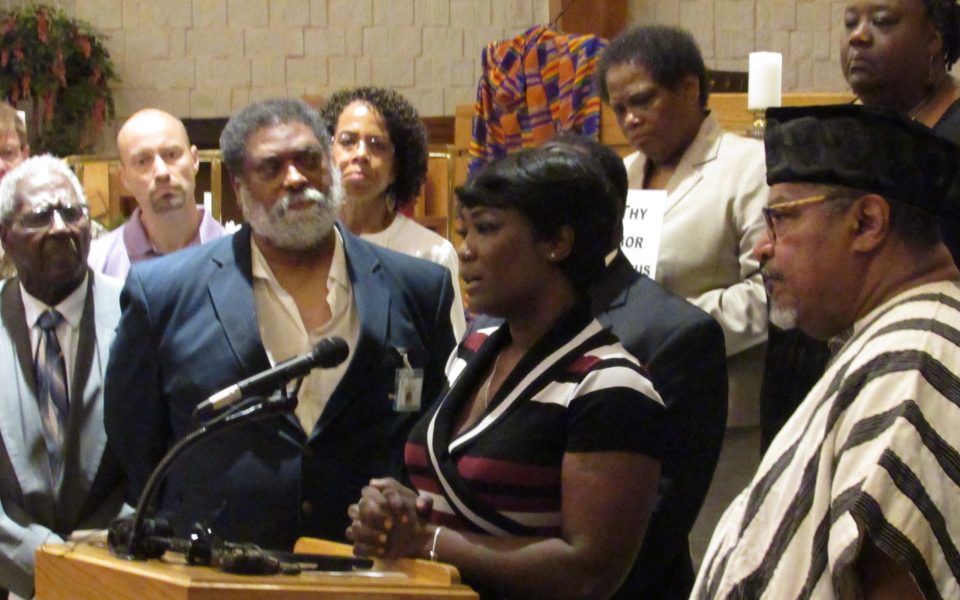A group of black clergy is calling for the termination of a Winston-Salem police officer who was involved in the forcible detention of a 14-year-old student at Hanes Magnet Middle School on Oct. 5.
“We have all seen the video of this 14-year-old student being pressed into the ground, her face shoved in the pavement and the officer’s knee to her back and his weight on her body,” the ministers said in a prepared statement during a press conference at Emmanuel Baptist Church on Wednesday. “Meanwhile, the principal and assistant principal stand by and watch.”
The video posted on Facebook by the student’s mother, Tamkea McLean, shows the school resource officer, who has been identified as Officer TB McCormick, pinning the student to the pavement in the school parking lot. The student can be heard screaming. A male voice, presumably the person who made the 37-second video, can be heard saying, “You don’t got to snatch on her like that. You don’t got to snatch on her like that.”
Reading the statement on behalf of the Ministers’ Conference of Winston-Salem & Vicinity, Bishop Todd Fulton said, “We believe nothing this student could have said or done deserves such a response from the school resource officer. She has been traumatized by her mistreatment, probably for the rest of her life.
“We are unambiguously clear that this would not have happened to a young white middle school girl,” Fulton continued. “It is the responsibility of adults to ‘lower the heat’ in adult-child conflict. De-escalation is the professional responsibility of law enforcement officers. They are sworn to ‘serve and protect,’ not abuse and traumatize.”
McLean said her daughter has not returned to school.
“It’s just so much to see my child hurt the way she hurts,” McLean told reporters. “And it makes me hurt to know that when we send our kids out here in the world, if they’re not protected by us and law enforcement, who will protect them? I would just really like justice for my daughter.”
The pastors said they are seeking a meeting with police Chief Catrina Thompson, and expect to hear a different set of facts from what McLean told them.
“The mother and child said the child was leaving class; she had a pass from her teacher,” Fulton said. “She was having female problems, cramps, and she needed to call her mother for some personal female items, and she was on her way down the hall when the resource officer stopped her.”
Chief Thompson said in a statement issued Wednesday afternoon that Officer McCormick responded to an incident of disorderly conduct, and began an investigation into disorderly conduct by fighting, which remains ongoing.
Thompson said that since the incident took place, McCormick has been transferred from the Educational Services Unit to the Investigative Services Bureau while an administrative investigation takes place. She also said McCormick has not had any disciplinary action since his employment with the police department began in 2012, and has not had any allegations of excessive force.
Alexandra Hoskins, chief of staff for Winston-Salem/Forsyth County Schools, declined to comment on Wednesday.
“Race is at the core of this,” said the Rev. Carlton Eversley. “This officer did not see this young lady as he would his own child. He would not have shoved her. He would not have put his knee to her back. He would not have put her face to the ground had she been someone reminiscent of his own child.”
Chief Thompson said McCormick received specialized training in verbal de-escalation skills as a crisis intervention team officer, and that he has received training in “bias free policing” and “implicit bias.”
Thompson said she is comfortable that McCormick’s selection to serve as a school resource officer was appropriate.
“Children have a right to expect the authorities, both in school and with law enforcement, of empathy, of tender treatment,” Eversley said. “Instead, what we see is a racial incident like this emblematic of what we call the school-to-prison pipeline where black children in school are disproportionately suspended and expelled and treated more harshly in the whole criminal justice process whenever a subjective decision has to be made — when to call somebody’s parents in or call the cops, when to send somebody home or send them downtown, whether they get a good talking to or go to a trial, whether they get convicted or not, whether they get convicted in institutions. At every step along the way, black children in America, in North Carolina and in Forsyth County are treated more harshly than white children who do the exact same thing.”
A November 2017 review of NC Department of Public Safety numbers by Triad City Beat found that black children in Forsyth County were seven times more likely to be referred to the juvenile justice system than their white counterparts.
Join the First Amendment Society, a membership that goes directly to funding TCB‘s newsroom.
We believe that reporting can save the world.
The TCB First Amendment Society recognizes the vital role of a free, unfettered press with a bundling of local experiences designed to build community, and unique engagements with our newsroom that will help you understand, and shape, local journalism’s critical role in uplifting the people in our cities.
All revenue goes directly into the newsroom as reporters’ salaries and freelance commissions.


Leave a Reply